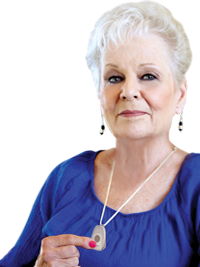by Dr. Don Rose, Writer, Life Alert
INTRODUCTION
A fall can happen to us all. This is true no matter what your age. While falls are not the inevitable result of growing older, the odds go up as you advance in age. This article addresses the common causes of falls, ideas to help avoid them, and what steps you should take if you do wind up falling.
FALLS AS INDICATORS OF OTHER PROBLEMS
Dizziness, lightheadedness, and general weakness can all cause falls. These conditions may indicate an unintended or unexpected interaction among medicines you are taking; ask your doctor to review your medicines if needed. Each of these conditions may also be a sign of an underlying medical problem. In fact, a fall may be a symptom of a serious illness, such as a
heart attack,
stroke,
internal bleeding, or
pneumonia. Finally, one or more falls may be an indicator of a drinking problem; alcohol abuse is an alarming trend today among an increasing number of seniors.
Many factors can lead someone, especially a
senior citizen, to be predisposed to losing balance. As one ages, eyesight and hearing ability tend to decrease. Slower reflexes, coupled with decreased coordination and muscle strength, can limit our ability to take action in avoiding a fall when it starts to happen. Other factors come into play as well. Medical conditions like heart disease or low blood pressure can affect balance. Medicines or alcohol can cause lightheadedness. Arthritis can throw off balance, and osteoporosis can weaken bones so they break more easily than when one is young.
Fortunately, the most preventable factors are usually things in the home. Many folks, especially seniors, just aren't aware of the hazards they have in their dwellings.
THE CAUSES OF FALLS
Many factors can lead someone, especially a
senior citizen, to be predisposed to losing balance. As one ages, eyesight and hearing ability tend to decrease. Slower reflexes, coupled with decreased coordination and muscle strength, can limit our ability to take action in avoiding a fall when it starts to happen. Other factors come into play as well. Medical conditions like heart disease or low blood pressure can affect balance. Medicines or alcohol can cause lightheadedness. Arthritis can throw off balance, and osteoporosis can weaken bones so they break more easily than when one is young.
Fortunately, the most preventable factors are usually things in the home. Many folks, especially seniors, just aren't aware of the hazards they have in their dwellings.
For more information about Life Alert and its many services and benefits for seniors nationwide, please visit the following websites:
http://www.lifealert.com
http://www.seniorprotection.com
http://www.911seniors.com/






